On Thursday, Hong Kong marks its first National Security Education Day since Beijing imposed a controversial new law last June. Despite growing restrictions on political activity and freedom of expression, city residents have continued to carry out acts of resistance. HKFP takes a look at how Hongkongers are continuing to make their voices heard.
Queueing
Last month, hundreds of people queued outside the West Kowloon Law Courts building in last to support 47 democrats charged under the national security law over their participation in primary election for the since-postponed Legislative Council election.

Despite having little or no chance of getting into the court, large numbers – many dressed in black to show solidarity – stayed in the orderly queue for hours to make their point.
Despite a heavy security presence and a police warning, people chanted protest slogans such as “five demands, not one less,” and “liberate Hong Kong, revolution of our times,” which may be in violation of the national security law.
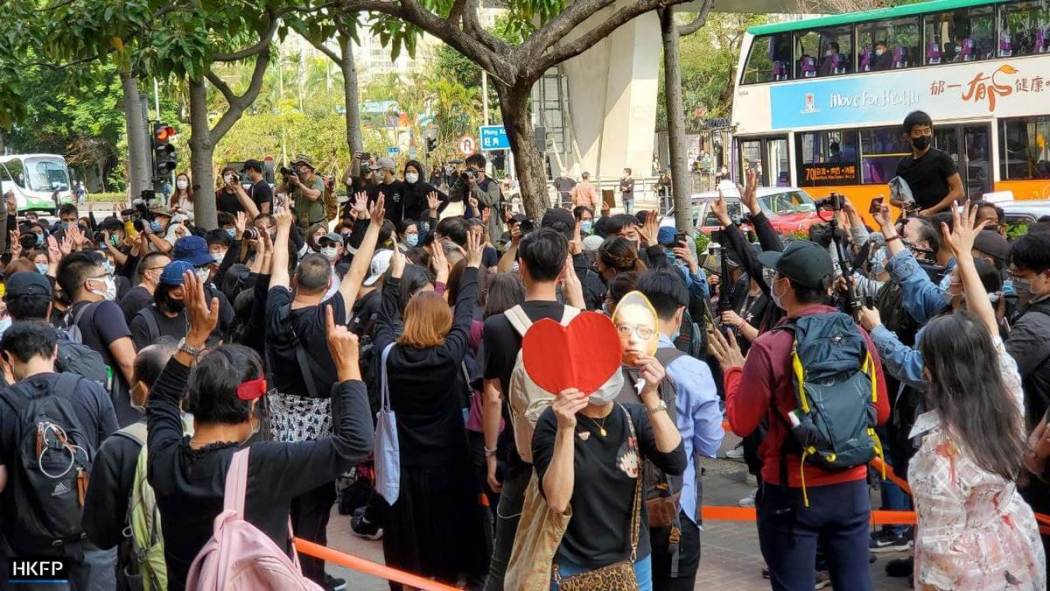
Apart from lining up to attend court hearings, Hongkongers have also resorted to an activity for which they are renowned – queueing up to shop. Most notably, they got in line to support AbouThai, a retail chain that was raided by Hong Kong Customs over missing safety warnings on some of its products.
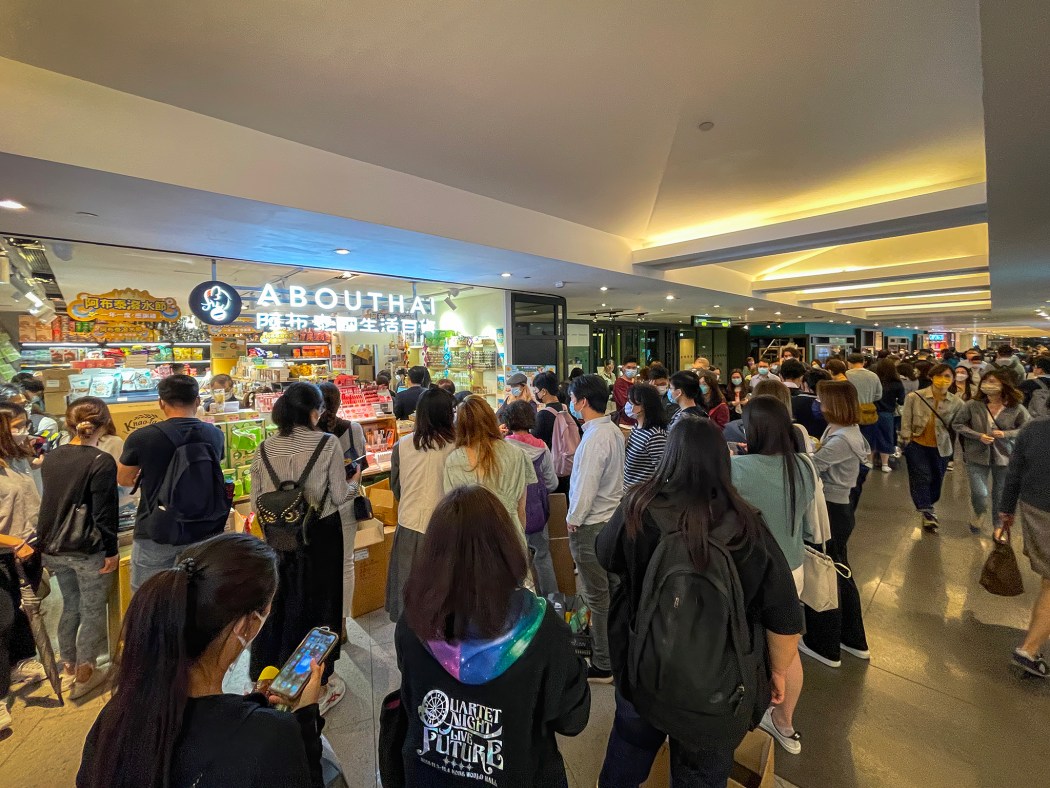
Co-ordinated customs raids saw the group’s 25 stores across the city – and a warehouse -searched and around HK$400,000 worth of products seized. Critics described the law enforcement action as politically motivated due to the fact that the founder of the group, Mike Lam, was is among the 47 democrats charged, and AbouThai stores were used as polling stations during the primary election in 2020.
The day after the raids, people queued up outside AbouThai stores to support the retail group, while other pro-democracy stores introduced promotions to encourage their customers to shop at the chain which imports products from Thailand.
Van chasers, court watchers and prison letters
According to the Security Bureau, 10,242 people have been arrested over the anti-extradition bill protests, and 2,521 people have either completed or are involved in ongoing legal proceedings.
As the number of court hearings piled up, a new group of people began to attend to show solidary and lend support not just to well-known activists, but also others who were prosecuted during the anti-extradition bill protests.
When prison vans leave court buildings, it is not uncommon to see people chasing after the them shouting goodbyes and support. Others have become “court watchers,” regularly turning up to the public gallery to witness trials.

With limited access to news and information behind bars, associates of remanded or jailed politicians have also provided addresses for the public to send letters to them.
Prisoners’ rights groups such as Wall-fare and Swallow Life are also pairing up jailed protesters with members of the public as pen pals to keep inmates in touch with the outside world.
Wall-fare has also gathered items such as snacks and cleaning supplies approved by the Correctional Services Department for activists in custody or in jail.
Yellow Economy
Shopping at AbouThai is not an isolated trend. In fact, many Hongkongers have made an effort to support pro-democracy shops and restaurants in their day-to-day life.

These shops are often referred as “Yellow shops,” and netizens have come up with lists of venues that fit the criteria – from cinemas to groceries stores – as an attempt to build a “yellow economy.” As a means to sustain the 2019 protest movement, people are able to consume while supporting shops that share the same ideals.
Many also boycott “blue stores,” which are venues associated with the establishment, China or the pro-Beijing camp.
Socially-distanced demos
Since the introduction of social-distancing rules in March last year, large-scale protests have been effectively banned with group gatherings currently limited to a maximum of four people.
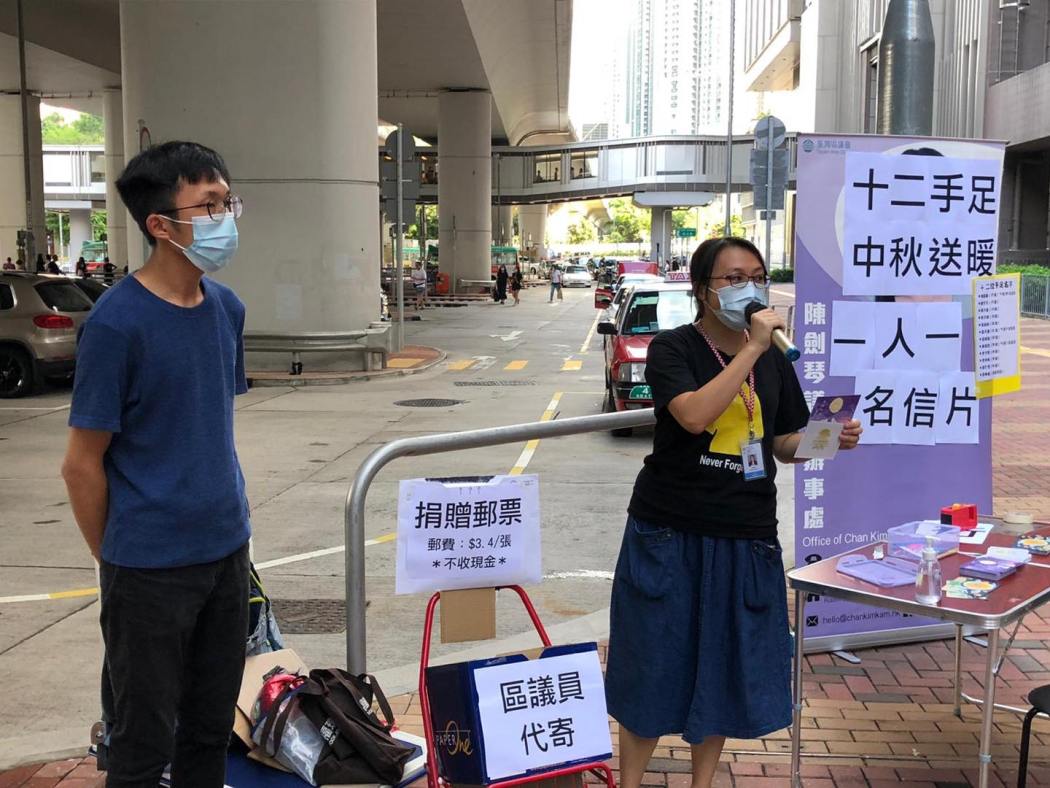
Protests, rallies, and street booths have since adapted to the anti-pandemic regulations by meeting in smaller groups. In cases where the number of participants exceeds the stipulated limitations, participants made sure to keep socially-distanced by standing at least 1.5 metres apart.

However, eight members from the League of Social Democrats and the Labour Party were jailed for 14-days and handed an 18-month suspended sentence over a socially-distanced protest on Labour Day last year.
Mass resignations
All pro-democracy lawmakers quit the Legislative Council in November last year after the government disqualified four of their colleagues: Kwok Ka-ki, Alvin Yeung, Kenneth Leung and Dennis Kwok.

The move came after the Standing Committee of the National People’s Congress (NPCSC) passed a resolution allowing the government to oust lawmakers that were deemed to be endangering national security.
Blanking it
After the implementation of the national security law, “Liberate Hong Kong, Revolution of Our Times,” a slogan popular during the anti-extradition bill protests, was deemed illegal by the government.
In response, the public held a “blank placard” protests in shopping malls across the city in July last year, in which protesters held up blank protest signs replacing the usual ones with slogans.

Lennon walls, another popular feature during the Umbrella Movement and the anti-extradition bill protests, also underwent a revamp after the enactment of the national security law.
Post-it notes normally filled with protest slogans and messages of support were left blank on Lennon walls across the city.

Netizens have also found alternative ways to get around the restrictions imposed on sensitive slogans, such as using a poster with the geometric shape of Chinese characters alongside the initials of the romanisation of Chinese characters, most notably, “GFHG, SDGM”, a popular protest cry.
Reading the Apple Daily
Buying and reading the pro-democracy tabloid Apple Daily has become an act of resistance in itself. The self-proclaimed “most outspoken pro-democracy media in Hong Kong” has faced a turbulent year after its founder Jimmy Lai was arrested and charged under the national security law.

The media tycoon was accused of committing fraud by violating land-lease terms, as well as using Twitter and his newspaper to “request” foreign governments to impose sanctions on Hong Kong and mainland Chinese officials.
Fundraising goes digital
With many pro-democracy activists and politicians facing lawsuits and huge legal fees, some started up Patreon pages which allow supporters to subscribe and provide monthly financial support to cover legal fees and living costs.
Democrats switched from crowdfunding pages to Patreon after self-exiled former lawmaker Ted Hui had his bank account frozen as part of a police money-laundering investigation in January.
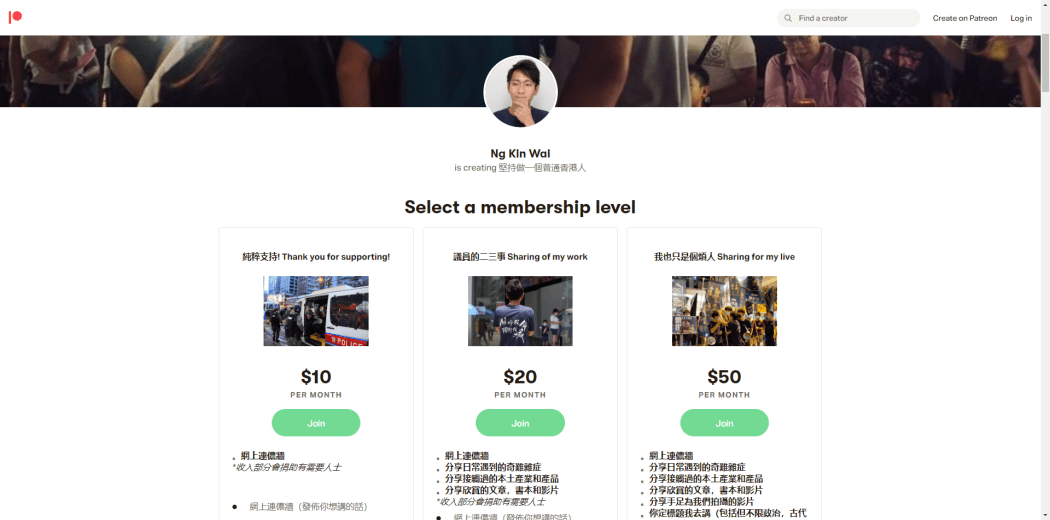
Spark Alliance, a non-profit group that raises money to provide financial aid to Hong Kong protesters, also had its bank account frozen in December 2019. Four people were arrested and the police put a lock on around HK$70 million in funds and insurance products.
The targeting of crowdfunding efforts by police failed to stop the public from supporting these campaigns. Another non-profit group, 612 Humanitarian Relief Fund, raised more than HK$11.5 million in six days in January following an appeal to the public for funds.
With much of resistance movement depending on fundraising during the annual July 1 pro-democracy, online options have offered an alternative.
Gaming
Hong Kong people have also taken their political activism into the virtual world. A group of activists have developed a computer game, Liberate Hong Kong, that recreates the experience of participating in an anti-extradition bill protest.
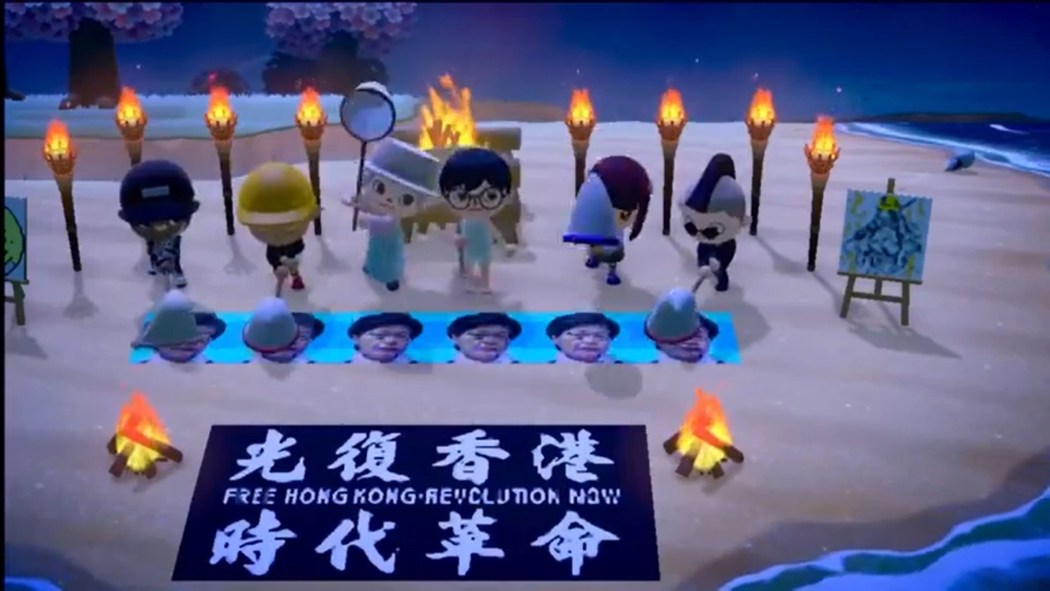
The popular Nintendo game Animal Crossing was also used to express political dissent by Hongkongers, as they have created pro-democracy and anti-government messages within the digital world, including flags containing protest slogans.
Holding vigil
Hongkongers have continued to lay floral tributes, pineapple buns and souvenirs at 2019 protest hotspots and sites where demonstrators lost their lives.

Small gatherings at Prince Edward Station, where baton-wielding police stormed onto the platforms, and in Tseung Kwan O where a young protester fell and later died, have continued.
Whilst some showed up to Victoria Park, many marked the anniversary of the 1989 Tiananmen Massacre online last June 4 after the outdoor vigil was official banned.
Yellow masks
Associated with the colour representing the pro-democracy camp during the protests, wearing yellow face masks became a symbol of dissent especially after a court judge requested people in court change their facemasks as one “should not express their personal opinion in court.”

However, Hong Kong face mask manufacturer Yellowfactory suspended its business operations after pro-Beijing lawmakers and newspapers said one of their designs violated the national security law.
One of the manufacturer’s most popular design was printed with “F.D.N.O.L.” – an abbreviation of the protest slogan “Five Demands, Not One Less.”
Overseas advocacy
Hongkongers who moved overseas have also continued their expression dissent even after they have left the city.
Eight Hong Kong pro-democracy activists in self-imposed exile overseas have launched a charter calling for democracy and autonomy in the city, as well as solidarity among Hongkongers overseas.
Apart from co-ordinated efforts from more well-known figures, Hongkongers have also organised rallies to support other groups. Stand News reported that more than a hundred Hong Kong people gathered in Manchester, England last Sunday to voice their support for protesters in Myanmar.
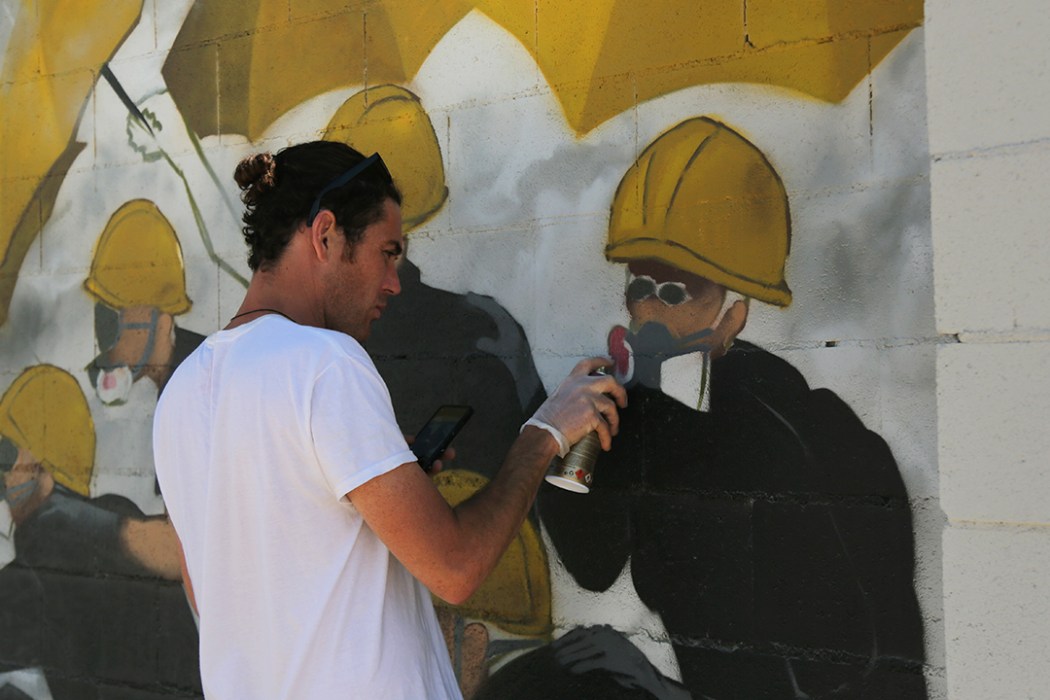
In California, a Hong Kong artist – who uses the alias “Divad” – created a mural to pay tribute to Hong Kong’s protesters at the Liberty Sculpture Park. The sensitive slogan on the mural would be in breach of the national security law if it was erected in Hong Kong.
Milk Tea Alliance
The shared love of milk tea across Asia has become a symbol for transnational solidarity against China when activists and protesters in Hong Kong, Taiwan, Myanmar, Thailand, and other countries in Southeast Asia. Netizens formed a “Milk Tea Alliance” online last year.

The alliance often voiced their support for other members, including by engaging in internet debates with netizens from mainland China. Twitter even created a milk tea emoji to highlight the protest movement during the first anniversary of the alliance.
Support HKFP | Policies & Ethics | Error/typo? | Contact Us | Newsletter | Transparency & Annual Report | Apps
Help safeguard press freedom & keep HKFP free for all readers by supporting our team
























